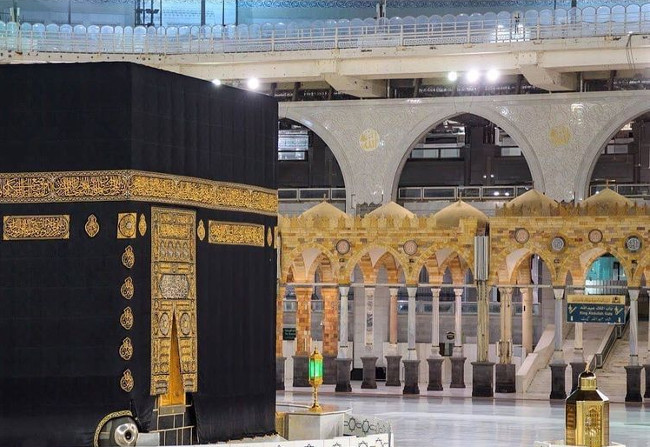 After the demise of Abdul Muttalib, Rasulullah (sallallahu ‘alaihi wasallam) was taken into the custody of his uncle, Abu Taalib. Abu Taalib loved Rasulullah (sallallahu ‘alaihi wasallam) more than his own children, and cared for him with great compassion and love until the end of his life.
After the demise of Abdul Muttalib, Rasulullah (sallallahu ‘alaihi wasallam) was taken into the custody of his uncle, Abu Taalib. Abu Taalib loved Rasulullah (sallallahu ‘alaihi wasallam) more than his own children, and cared for him with great compassion and love until the end of his life.
His deep and strong attachment to Rasulullah (sallallahu ‘alaihi wasallam) was such that at all times, he kept Rasulullah (sallallahu ‘alaihi wasallam) with him. Even when going to sleep at night, he would ensure that Rasulullah (sallallahu ‘alaihi wasallam) slept at his side.
At that time, Abu Taalib did not possess a lot of wealth, but as soon as Rasulullah (sallallahu ‘alaihi wasallam) began to stay with him, he began to witness great and abundant blessings enter his home on account of Rasulullah (sallallahu ‘alaihi wasallam). (Bidaayah wan Nihaayah 2/262)
Undoubtedly, in taking care of Rasulullah (sallallahu ‘alaihi wasallam), Abu Taalib had fulfilled the responsibility of raising and caring for him with great compassion and love. Sadly, despite his devoted guardianship and loving care for Rasulullah (sallallahu ‘alaihi wasallam), on account of him not following Rasulullah (sallallahu ‘alaihi wasallam), he was deprived of the wealth of Islam.
Abu Taalib Seeking Rain Through the Intermediary of Rasulullah (sallallahu ‘alaihi wasallam)
Once, a severe drought struck Makkah Mukarramah. Seeing the difficulty which the people of Makkah Mukarramah were undergoing, the Quraish held a meeting to look for a way through which they will be able to alleviate their difficulty. One of the Quraish spoke and said, “I feel that we should go to the idols, Laat and Uzzaa, and seek help from them!” Another person said, “I feel that we should go to the three idols of Manaat and seek their assistance!”
Hearing this, an old man, who possessed intelligence and wisdom, addressed them saying, “How are you being misled for turning to these idols, whereas you have in your midst the person who is a descendant from the noble family of Nabi Ebrahim (‘alaihis salaam) through his son, Nabi Ismail (‘alaihis salaam)?” The people asked him, “Are you referring to Abu Taalib of the Quraish?” He said, “Yes, I am.”
The people thus came to Abu Taalib and pleaded with him to make dua for rain. They said, “O Abu Taalib! The valley of Makkah is beset by drought, and our families are suffering from hunger, so please come and make dua for rain!” Abu Taalib agreed, and accompanied by a group of people, he took Rasulullah (sallallahu ‘alaihi wasallam) and set out for the Haram. On reaching the Haram, Abu Taalib made Rasulullah (sallallahu ‘alaihi wasallam) stand with his back touching the Ka’bah, facing the people.
Thereafter, Rasulullah (sallallahu ‘alaihi wasallam), turned to Allah Ta‘ala in supplication for rain, and with utmost humility, he pointed his index finger to the sky. Prior to this, there was no sign of any cloud in the sky. However, the moment Rasulullah (sallallahu ‘alaihi wasallam) pointed his index finger to the sky, Allah Ta‘ala caused clouds to suddenly appear from every direction. It then began to rain, to such an extent that all the gulleys of Makkah Mukarramah were flowing with water.
The famous poetry of Abu Taalib, in praise of Rasulullah (sallallahu ‘alaihi wasallam) also makes mention of Rasulullah (sallallahu ‘alaihi wasallam) being the blessed personality through whose intercession rain is sought from Allah Ta‘ala. In this poetry, Abu Taalib says:
وأبيض يستسقى الغمام بوجهه ثمال اليتامى عصمة للأرامل
“He (sallallahu ‘alaihi wasallam) is so illuminated, that through his blessed face, rain is sought from Allah Ta‘ala. He is a sanctuary for the orphans and a refuge for the widows.”
يلوذ به الهلاك من آل هاشم فهم عنده في نعمة وفواضل
Those who undergo difficulty from the Banu Haashim seek assistance from Allah Ta‘ala through his intermediary and they, the Banu Haashim, continue to enjoy abundant favours and special bounties on account of him.
(Sharhuz Zurqaani 1/355-357)
In regard to the above couplets, the Muhadditheen have mentioned that these couplets of Abu Taalib are part of a lengthy poem he composed regarding Rasulullah (sallallahu ‘alaihi wasallam). This entire poem consists of seventy to eighty couplets.
However, some Muhadditheen have raised the question as to how Abu Taalib came to know that Rasulullah (sallallahu ‘alaihi wasallam) is the blessed personality through whose intercession rain is sought from Allah Ta‘ala, whereas the incidents of Rasulullah (sallallahu ‘alaihi wasallam) seeking rain from Allah Ta‘ala all transpired in Madinah Munawwarah, long after the demise of Abu Taalib.
Some Ulama have answered this question by saying that Abu Taalib had learnt of this from Baheeraa, the Christian monk whom he had met in Syria with Rasulullah (sallallahu ‘alaihi wasallam) when Rasulullah (sallallahu ‘alaihi wasallam) was twelve years old. It is for this reason that when the people of Makkah Mukarramah were afflicted with drought, Abu Taalib took Rasulullah (sallallahu ‘alaihi wasallam) to the Ka’bah and sought rain through his medium.
Other Ulama answer this question by saying that Abu Taalib had come to know of Rasulullah (sallallahu ‘alaihi wasallam) being the blessed personality through whose intercession rain is sought on account of an incident that transpired in Makkah Mukarramah during the time of his father, Abdul Muttalib.
Allaamah Suhayli (rahimahullah) reports that once, during the era of Abdul Muttalib, drought broke out in Makkah Mukarramah, due to which Abdul Muttalib made dua for rain through the medium of Rasulullah (sallallahu ‘alaihi wasallam). Hence, Abu Taalib had witnessed this incident, and therefore he also sought rain through the medium of Rasulullah (sallallahu ‘alaihi wasallam) when the people of Makkah Mukarramah were experiencing drought after the demise of Abdul Muttalib.
(Taqreer-e-Bukhaari 3/491)
Source: The Illustrious Sahaabah
 Ihyaaud Deen An Effort to Revive Deen in Totality
Ihyaaud Deen An Effort to Revive Deen in Totality



